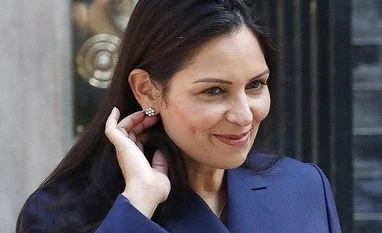Priti Patel, Britain's new interior minister, is a right-wing, hardcore Brexiteer who was previously sacked from the cabinet for secret meetings with the Israeli government.
Home Secretary Patel, 47, impressed Britain's new Prime Minister Boris Johnson when she campaigned beside him for "Vote Leave" in the 2016 EU membership referendum.
Patel is a social conservative who has voted against introducing same-sex marriage and has expressed support for restoring the death penalty -- although she has since rowed back.
On taking office, Johnson promoted her to one of the chief ministries. She was the most senior woman around the new cabinet table when it first met on Thursday.
The rising star is now in charge of law and order in Britain.
"I will do everything in my power to keep our country safe, our people secure and also to fight the scourge of crime that we see on our streets," she said.
More From This Section
The home secretary is considered one of the four Great Offices of State in Britain, along with prime minister, finance minister and foreign minister. The Home Office is in charge of counter-terrorism, immigration, crime and policing, and drugs policy.
But the sprawling ministry is sometimes considered a poisoned chalice. A blunder somewhere in its vast remit often brings down home secretaries.
Patel was a trenchant critic of former prime minister Theresa May's EU divorce deal -- voting against it every time in parliament and thereby helping to end her tenure in office and usher in Johnson on Wednesday.
The free market enthusiast is a fan of the late prime minister Margaret Thatcher and her Twitter banner shows a picture of Thatcher and US president Ronald Reagan in the 1980s.
Patel's parents are Gujarati Indians who moved to Uganda. They fled to Britain in the 1960s, shortly before dictator Idi Amin expelled Asians from the East African country, and set up a chain of newspaper shops.
She read economics at university, and then did postgraduate studies in British government and politics.
She headed the press office for the short-lived anti-EU Referendum Party in the 1997 general election before joining the new opposition Conservative leader William Hague's press team.
Patel left in 2000 to work for public relations firm Weber Shandwick, then moved to alcoholic drinks multinational Diageo.
Former Conservative leader David Cameron placed her on a so-called A-list of prospective MPs and put her into a safe seat in the 2010 general election.
She joined Cameron's policy unit in 2013 and was made a junior Treasury minister the following year.
After the 2015 election, she was given her first cabinet-attending post as employment minister.
May made Patel her first international development secretary when she took office in July 2016.
But it was all over in November the following year.
Patel had apologised for holding 12 separate meetings -- including with Prime Minister Benjamin Netanyahu -- during a family holiday to Israel in August 2017, without notifying the Foreign Office or Downing Street in advance.
Patel discussed the possibility of British aid being diverted to the Israeli army to support medical assistance for Syrian refugees arriving in the Israeli-occupied Golan Heights.
She acknowledged that her actions "fell below the high standards" expected.
)